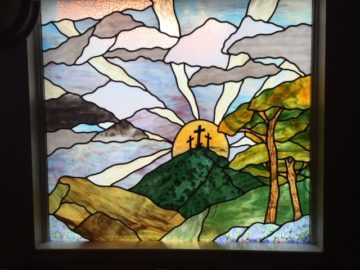On this Twentieth Sunday of Ordinary Time we offer a Franciscan Gospel reflection and questions written by Fr. Paul Gallagher, OFM for your prayer. They are edited by Franciscan Sister of Christian Charity Sister Anne Marie Lom and Joe Thiel. The excerpts from the Sunday readings are prepared by Joe Thiel. To read or download the complete pdf with excerpts for your prayer, please click here: Franciscan Gospel Reflection August 18 2019. Excerpts are from the Lectionary for Mass for Use in the Dioceses of the United States of America, second typical edition © 2001, 1998, 1997, 1986, 1970 Confraternity of Christian Doctrine, Inc., Washington, DC. Used with permission. All rights reserved. No portion of this text may be reproduced by any means without permission in writing from the copyright owner. Photos: St. Paul Elder Services, Kaukauna, Wisconsin.
Luke 12:49-53
Jesus said to his disciples: “I have come to set the earth on fire, and how I wish it were already blazing!” There is a baptism with which I must be baptized, and how great is my anguish until it is accomplished!
“Do you think that I have come to establish peace on earth? No, I tell you, but rather division. From now on a household of five will be divided, three against two and two against three; a father will be divided against his son and a son against his father, a mother against her daughter and a daughter against her mother, a mother-in-law against her daughter-in-law and a daughter-in-law against her mother-in-law.”
Background:
The text for today’s gospel follows directly after last week’s gospel. Last week the gospel began with a gentle reminder not to fear, but to trust in God’s compassion. Jesus then turned directly to the disciples with two parables that emphasized their need to be vigilant in the responsibilities entrusted to them. The second parable concludes with the admonition that much is expected of those who have received much.
In today’s gospel, Jesus speaks in a way that can be disturbing. Often in the gospels, Jesus’ encounters with the disciples begin with the greeting, “Peace.” Therefore, when he says that he has come not to bring peace but division, his statement seems out of character and even shocking. Jesus sounds more like the person John the Baptist foretold was coming when he said, “One mightier than I is coming after me. I am not worthy to stoop and loosen the thongs of his sandals. I have baptized you with water; he will baptize you with the Holy Spirit.” (Mark 1:7-8)
Consider another gospel text that that might shed some light on this Jesus who speaks so strongly. In Mark’s gospel, James and John approach Jesus with a request. ‘Grant that in your glory we may sit one at your right and the other at your left.’ Jesus says to them, ‘You do not know what you are asking. Can you drink the cup that I drink or be baptized with the baptism with which I am baptized?’ (Mark 10:37-38)
The most important thing to remember here is Jesus’ own experience. All three synoptic gospels record Jesus’ rejection when he returned home after he began his ministry of preaching and teaching.
Jesus returned to Galilee in the power of the Spirit, and news of him spread throughout the whole region. He taught in their synagogues and was praised by all. He came to Nazareth, where he had grown up, and went according to his custom into the synagogue on the sabbath day… When the people in the synagogue heard this, they were all filled with fury. They rose up, drove him out of the town, and led him to the brow of the hill on which their town had been built, to hurl him down headlong. But he passed through the midst of them and went away. (Luke 4:16, 28-30)
He came to his native place and taught the people in their synagogue. They were astonished and said, “Where did this man get such wisdom and mighty deeds?
Is he not the carpenter’s son? Is not his mother named Mary and his brothers James, Joseph, Simon, and Judas? Are not his sisters all with us? Where did this man get all this?” And they took offense at him. But Jesus said to them, “A prophet is not without honor except in his native place and in his own house.” And he did not work many mighty deeds there because of their lack of faith. (Mt 13:54-58)
He departed from there and came to his native place, accompanied by his disciples. When the sabbath came he began to teach in the synagogue, and many who heard him were astonished. They said, “Where did this man get all this? What kind of wisdom has been given him? What mighty deeds are wrought by his hands! Is he not the carpenter, the son of Mary, and the brother of James and Joses and Judas and Simon? And are not his sisters here with us?” And they took offense at him. Jesus said to them, “A prophet is not without honor except in his native place and among his own kin and in his own house.” (Mk 6:1-4)
Jesus experienced rejection from his extended family unit, his hometown. To be rejected by one’s family was life-threatening. Family relationships formed a network of protection and socialization, and in many cases, they were necessary for survival. People did not go off to the store if they needed supplies, or if a distant relative came to visit and there was nothing to offer in hospitality. One went instead to the neighbor who was also relative and knocked at their door, no matter the hour. Jesus knew what it was like to have those relationships jeopardized because of his choice. His disciples would and did experience similar kinds of rejection by their choice to adopt his values and beliefs. Yet he was fully dedicated to his message, and to living by the values of the reign of God, no matter how unpopular that might be with his family or those in authority.
Reflection Questions:
1. What images come to mind when you think of fire?
2. In an effort to keep peace within my family, I have…
3. Can you recall a time when you have said or acted in a way that you knew might jeopardize an important relationship?
4. My image of Jesus is of one who…
5. When I encounter the Jesus who upsets and provokes people, I…
6. Do you think Jesus was concerned about how his words would affect those who heard them?
7. Do you know people who seem to be on fire with the gospel? How would their community be different without such people? How would be you be different?
8. Can you take some time to talk to God honesty and frankly about how you hear Jesus’ desire that the world be on fire in today’s gospel?






